
The architecture of Munich varies from medieval to contemporary, with many buildings colorfully painted in delightful patterns, lending a whimsical look to simple facades like this one.
 Garrett Hack |
The name might give you a chuckle, but for 165 years, the German company DICK has been in the serious business of making and selling some of the world’s best woodworking hand tools. To put this in perspective, Stanley is only about half as old.
DICK also runs an amazing variety of workshops on everything from knife making to gilding, furniture making to building a Japanese long bow (as they would have been made, with a layer of water buffalo horn for extreme flexibility). I taught two classes there in late October, in English, to a group from Estonia, Germany, Hungary, the U.S., and Turkey.
The workshop, and DICK’s tool showroom, are in the small town of Metten, a little over an hour from Munich in the southeastern part of Germany known as Bavaria. The hills roll and the Danube flows swiftly by huge fields of sugar beets, with the Alps in the distance. Metten is a typical German town of white washed houses with tile roofs along winding streets, a few restaurants and shops, a thousand year old monastery, and lots and lots of paths to walk. My wife and I stayed in a simple and very nice guesthouse a comfortable walk to the workshop through a spruce forest.
As you would expect of German attention to detail, the workshop is impeccably organized, well lit, spacious, and full of more hand tools than you ever knew existed. One room is just for sharpening with special high tables and every sharpening method known. And then there is a large bench room, a machine room with big industrial tools, and a lounge where we ate lunch every day (catered) with an espresso machine, fresh fruit, and a large library of books and magazines.
|
More Fantastic Shops & Tips |
To understand why I was there you have to know something about the German woodworking scene. No doubt in some areas there is innovative one-off work being done, but not much. From what I could learn and observe, German woodworking is highly skilled, but conservative and quite bound to tradition, often heavy, and overly ornate. It’s not the kind of work a hobbyist would attempt, nor necessarily what you would actually want to live with. So here I come to introduce new ideas, such as some of the light Federal details I love to use.
Language was much less of a barrier than I had feared, in fact we laughed a lot trying to translate some of my English expressions. Many times at the workshop or guesthouse there would be several languages going, questions flying back and forth, lots of hand gesturing, and drawings quickly made when we needed them. Everyone was extremely friendly and curious. And they love to hang out and drink great beer.
Going to Germany was an enriching experience. Connections were intimate, sharing continuous, inspiration lasting. I shared a sense of how we live and how I make a living building furniture, while my students and others shared about their lives and views of the world — often quite different from our US centric vision. I wouldn’t go to Germany just to take a class, but the overall experience will stick with you for a long time. Spend a few days in Munich and just walk, or soak in the design ideas at Munich’s world- class science museum or the modern art and design Pinakothek, for years of furniture ideas.
Since train travel is so easy, we left after my classes to spend 4 days in Vienna, just a short trip from Metten. Vienna was a hotbed of furniture creativity for centuries, from Biedermeyer to Hoffmann and the Weiner Werkstatte (Vienna Workshops). The Klimpts and Scheiles are not to be missed either.
I’ll be back in May for a small cabinet project, which as one student put it, “is an encyclopedia of woodworking”. A direct flight from Boston to Munich on first-rate Luftansa is 6 – ½ hours, and once you get there food, lodging and beers are a bargain.



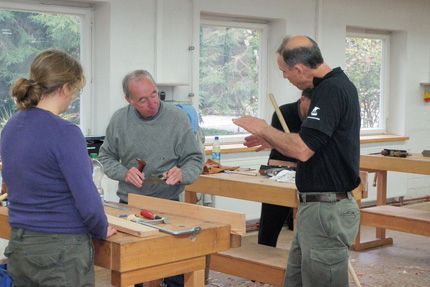
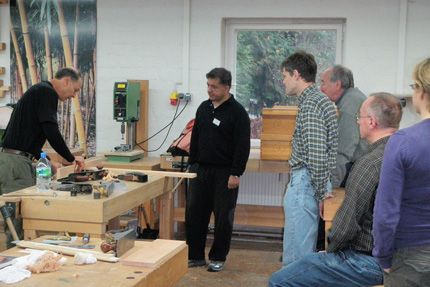
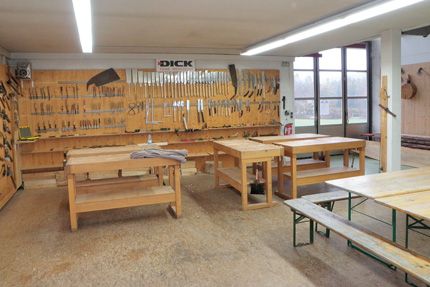
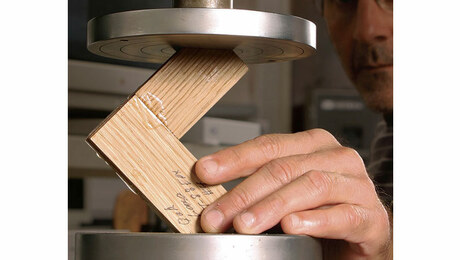

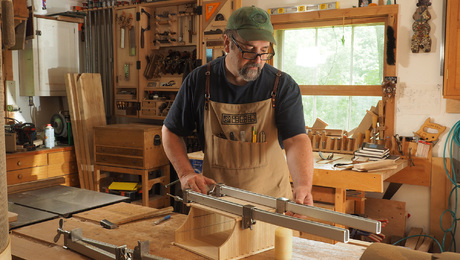
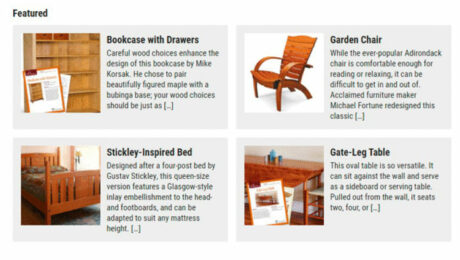


















Comments
Garrett, "in May for a small cabinet project". Are you gonna do a video? Hope so. Looking forward to watching you work again. Gary
Espresso machine at the school... I like the sound of that.
If anyone's interested in more German woodworking resources, check out these sites...
A German woodworking magazine: http://www.holzwerken.net/
And a site by German DIY guy Guido Henn: http://www.hobbywood.de/index.html
he has some free videos here: http://www.hobbywood.de/videos.html
Hey Garrett, looks like you are racking up those frequent flier miles again :)
When are you coming back to Japan! :)
GEide-
Thanks for the excellent link to that first German site. They have some very interesting videos. I really liked the one about the shop-made pin router. Plus, I seem to be able to watch all of their videos without paying a subscription fee. Now if I only spoke German...
Interesting. I've been to Germany half a dozen times in the last decade (not wood-related, that's just my hobby). The German woodworking scene baffles me. I have scoured every newsstand and bookstore I could find - including some huge multi-story bookstores - and I could never find *anything* about woodworking... no magazines, no books, nothing. There are a couple of DIY magazines but they're not about "serious" woodworking. The holzwerken site that GEide posted is interesting; it must either be new or not available in newsstands.
I even talked to a guy at a small shop I found in the Black Forest once. As far as I could tell from my limited German, he had never even heard of the concept of a woodworking magazine before. I showed him a couple and he was amazed. But he had a fully functional shop with all the machines and hand tools you'd expect.
Yet, there are so many really good German tools out there... Fein, Festool, Dick, many others. And a lot of good German work... the cuckoo clocks of the Black Forest come to mind.
All I can figure is that either there is very little *hobbyist* woodworking, or there's something very different culturally when it comes to magazines. Yet there are hundreds of magazines on just about any other topic you can think of!
Any further insight you might have, Garrett, would be great.
As always, Garret is a superb teacher and revered spokesman for those who espouse honesty,hard work and respect for our heritage and environment.
Enough,I have now embarrassed him!
Love to hear more of his adventures.
Mike B.
As always, Garret is a superb teacher and revered spokesman for those who espouse honesty,hard work and respect for our heritage and environment.
Enough,I have now embarrassed him!
Love to hear more of his adventures.
Mike B.
Garrett: From the look of the tools I'm sure you delighted your students by putting some to good use. Keep reporting on your travels, the tools and techniques used and the local woods both in the shop and in the surroundings. Munich's Science Centre was the inspiration for the Ontario Science Centre built in '67. I would love to see it some day. Keep doing what you do best!!! Cheers, Ron
I'm originally from Germany (now living in Switzerland, but when it comes to woodworking the German speaking parts of Europe are not all that different) and would like to add a few insights into the German woodworking scene. Woodworking over here is indeed quite a different story from what you guys are used to, both professional and hobbyist. I guess it all goes back to the historical development of the woodworking trade, over centuries the guilds have rigorously controlled all kinds of crafts, and are still doing so in some respects. The American idea of free entrepreneurship hasn't really had a chance to develop here in crafts and trades, and there is still a strict separation of hobbyists and professionals. It is practically unheard of that someone can start a woodworking business without a proper (usually 4-year) apprenticeship in a woodworking trade ("Tischler" or "Schreiner" = cabinet maker oder joiner, "Zimmermann" = carpenter) approved by the respective guild, followed by several years as a "Geselle" (journeyman) and then passing the "Meisterpruefung" (examination for the master craftsman's diploma).
Woodworking as a hobby (specifically woodworking as opposed to "household DIY" in general which has always been a common pastime :-) is a rather new concept and there are still very few people involved in the woodworking scene. Many are turning to to the American woodworking communities as there is much more going on there. I know that some of the regulars in German speaking woodworking forums (e.g. http://www.woodworking.de/cgi-bin/holzbearbeitungsmaschinen/webbbs_config.pl) are posting in Knots, WoodNet, SawmillCreek etc. as well.
@Garrett: with regard to the "conservative", "overly ornate" designs, there is a noticable trend towards simpler, cleaner lines (e.g. Shaker style) which has been going on for quite a while now, mostly among the hobbyist woodworkers mentioned above. http://holzzeitung.blogspot.com is a good example, Bernhard is one of several people who have built your Versatile Huntboard. I too would have liked to attend your classes at Dick in Metten this year, but just couldn't take the time off from my daytime job.
@BobDeen: German language woodworking magazines are certainly a tragedy. As far as I know there are only 2 titles out (tiny players by US standards): one is a paid magazine (http://holzwerken.net which has a translated piece from Fine Woodworking from time to time), the other is more or less a series of ads sponsored by Festool (http://www.holzidee-magazin.de), both of which are nearly impossible to get at magazine stands, because only very few magazine stands/book stores carry them. I can only imagine that's because the market is so small (but then, how can the US market afford half a dozen woodworking magazines?). Many "serious" hobbyists here subscribe to Fine Woodworking or some other US or UK publication. The tool scene is just as tragic: internationally renowned brands such as Festool, Fein, Altendorf, Martin, Lamello, Bessey (the list goes on indefinitely) cater primarily for the professional market, consequently their pricing for me (as a woodworking hobbyist) is mostly out of reach (I know you guys often consider Festool over-priced, but wait until you hear about their pricing in their "home market": it's often twice as much here!). Even Bosch powertools carries two product lines here: Bosch "blue" is the professional (spell: more expensive) line, whereas Bosch "green" is the hobby line (not sure whether the blue Bosch products in the US always coincide with the European "blue" ones, as their part numbers don't match at all). On the other hand, North American made tools (Lie Nielsen, Lee Valley/Veritas, Leight jigs, Incra, etc.) are increasingly popular over here.
@rlborst: Guido Henn is cool, the closest you will find to an "American type" woodworker in the German scene. He is a pro, I believe he's gone through the chore of traditional professional training (see above), but is also tending to the hobbyist. He's just got a new router book out (http://www.amazon.de/Handbuch-Oberfr%C3%A4se-Ausw%C3%A4hlen-bediehnen-beherrschen/dp/386630949X, only available in German) which is very well written and - coincidentally or not - very "American style". He has also written for Fine Woodworking online before, see https://www.finewoodworking.com/subscription/Workshop/WorkshopArticle.aspx?id=28775 and (for a video) https://www.finewoodworking.com/subscription/Workshop/WorkshopArticle.aspx?id=29166.
Cheers, Eckard
@each65: Thanks for that comment, I was nearly loosing hope to find a community for wood working here in germany... After getting to know all the great US Sources for woodworking it really confuses me, that even bigger bookshops give me strange looks when I ask about woodworking books. And to be honest, Holzwerken has some nice and informative videos, but their style is really unappealing to me.
I hope the german hobbyists can be able to build a network and start having interesting conversations and share inspiration and experiences like the US or UK does. It is really frustrating to hear stories about lumberyards or toolshops, which are just not applicable here... When I get a little more experience I will try to start a blog to help reach that.
Log in or create an account to post a comment.
Sign up Log in